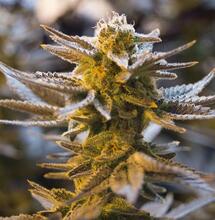Cannabis and Alzheimer's Disease

Cannabis has been found to potentially inhibit the development of the condition that creates Alzheimer's and robs people of their memories.
Cannabis has been found to potentially inhibit the development of the condition that creates Alzheimer's and robs people of their memories.
Alzheimer's disease (AD) will affect too many people as they age and grow older and diagnoses of the ailment are predicted to continue to increase in the twenty-first century. As people age, the symptoms of this disease begin to collect and fog the mind and memory. By 2050, one in eighty-five people will have this condition globally.
|
Ronald Reagan and Charlton Heston before both eventually being diagnosed with Alzheimer's [Credit: Wikipedia.org] |
Alzheimer's disease is most often diagnosed after the age of sixty-five, but may begin earlier. The condition was discovered in 1906 by the German psychiatrist and neuropathologist Alois Alzheimer and was thus named after him. The cause for this condition is still uncertain and a cure is not known at present. Symptoms worsen as a person ages and eventually lead to death. Most patients will die within seven years of diagnosis and less than three percent live past the fourteen-year mark. Symptoms begin with difficulty in remembering recent events (short term memory loss).
Alzheimer's is a neurodegenerative condition whose cause and progression are not well understood by science. Symptoms vary from person to person. Short term memory loss is common as people age and is often missed as the beginnings of Alzheimer's disease. Other symptoms can include confusion, aggression, irritability, mood swings and trouble with language and speech. Gradually, a person withdraws from family and society. In the final stages, bodily functions are lost and death occurs. Tests to evaluate thinking ability and behavior are used for diagnosis. If possible, a patient will have a brain scan for confirmation.
The human progression into dementia with age has been known by ancient Greek and Roman physicians. Alois Alzheimer was the first to describe the symptoms in a fifty-year-old woman. This led to a distinction of pre-senile dementia or Alzheimer's in individuals between the ages of forty-five and sixty-five. Later, the term came to describe a type of dementia with symptoms distinct from senile dementia and was used to describe patients of all ages who exhibited those symptoms.
True confirmation for an Alzheimer's diagnosis occurs at autopsy. In general, when a person dies and has an autopsy, only seventy percent of the time was the diagnosis of their disease correct. Alzheimer's disease patients have characteristic neurofibratory tangles inside neuronal brain cells and beta-amyloid plaques deposited between neurons in their brain.
|
Alzheimer's diseased brain comparisons [Credit: Wikipedia.org] |
Science has developed several possible causes for Alzheimer's disease and its symptoms. One of the earliest linked the development of the condition to the use of aluminum cookware and kitchen utensils. This theory, as well as another linking Alzheimer's to copper, zinc and iron, have been discounted; a genetic marker has been identified. Most patients with Alzheimer's have an amyloid precursor protein gene located on chromosome twenty-one. People with 'trisomy 21' (Down syndrome) have an extra copy of this gene and almost all of these people develop the symptoms of Alzheimer's by the age of forty.
Mice that are genetically altered to express a mutant form of the APP gene develop amyloid plaques with brain pathology and spatial learning deficits. Variants of this gene are neuroprotective against AD. Some associative link to the possession of this gene seems apparent. These individuals with Alzheimer's also have an isoform of the apolipoprotein APOE4. Apolipoproteins enhance the breakdown of amyloid plaques, but some isomers (isoforms) are less effective in this process than others. The APOE4 isoform slows the destruction of amyloid plaque and is similarly linked to the formation of Alzheimer's disease.
Intracellular Tau proteins also seem to be involved in the development of AD. Tau proteins aid the formation of microtubules inside neurons, which give the cells an internal transportation system. Tau proteins become chemically altered and form molecular tangles inside cells that alter the transportation of the molecular building blocks in brain neurons.
|
Cannabis can help: Low doses of THC reduce the production of amyloid beta and also selectively enhance mitochondrial function |
How can Cannabis help? Researchers from the USF Health Byrd Alzheimer's Institute showed that extremely low doses of THC reduce the production of amyloid beta, the soluble form of amyloid protein that creates the amyloid plaques between brain neurons and prevents abnormal accumulation of this protein - a process considered one of the pathological hallmarks evident early in the memory-robbing disease. These low concentrations of THC also selectively enhanced mitochondrial function, which is needed to help supply energy, transmit signals and maintain a healthy brain.
These findings were reported in the Journal of Alzheimer's Disease. They were discovered using a cellular model of Alzheimer's and the findings still require further testing for verification. THC is already known to be a potent antioxidant with neuroprotective properties. This is the first study to show that THC can have a positive effect on Alzheimer's pathophysiology by decreasing amyloid levels, decreasing amyloid aggregation and enhancing mitochondrial function. The low dose of THC necessary for this minimizes the risks of THC toxicity or memory impairment.
What can a person do to avoid senile dementia or Alzheimer's disease? Good genetic material with the absence of genes that put one at risk is important. Avoiding situations that may activate these genes and cultivating habits that decrease the activation of these genes can help. The Mediterranean diet has been found to decrease the incidence of Alzheimer's disease. Caffeine also seems to help. The B vitamin choline may help some individuals. Flavonoids in cocoa and red wine also seem to provide some protection.
Mental activity during life seems to be an important tool. Recalling the exercise adage "If you don't use it, you'll lose it," using and developing one's brain during life and especially as one grows older staves off the development of impaired cognition. Crossword puzzles, playing cards, chess or playing a musical instrument are all activities that reduce the chances of developing this condition. Regular social interaction seems to inhibit and slow the development of age-related dementia.
More research into the benefits of THC for treatment and prevention of Alzheimer's disease needs to be done. In the meantime, mental and physical exercises seem to be the best tools to prevent Alzheimer's disease - no surprise there!



